|
|
|
Sort Order |
|
|
|
Items / Page
|
|
|
|
|
|
|
| Srl | Item |
| 1 |
ID:
182246
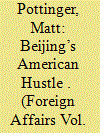

|
|
|
|
|
| Summary/Abstract |
Although many Americans were slow to realize it, Beijing’s enmity for Washington began long before U.S. President Donald Trump’s election in 2016 and even prior to Chinese
President Xi Jinping’s rise to power in 2012. Ever since taking power
in 1949, the ruling Chinese Communist Party (CCP) has cast the
United States as an antagonist. But three decades ago, at the end of
the Cold War, Chinese leaders elevated the United States from just
one among many antagonists to their country’s primary external adversary—and began quietly revising Chinese grand strategy, embarking on a quest for regional and then global dominance.
|
|
|
|
|
|
|
|
|
|
|
|
|
|
|
|
| 2 |
ID:
182240
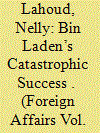

|
|
|
|
|
| Summary/Abstract |
OnSeptember 11, 2001, al Qaeda
carried out the deadliest foreign
terrorist attack the United States
had ever experienced.ToOsama bin
Laden and the other men who planned it,
however, the assault was no mere act of
terrorism.
|
|
|
|
|
|
|
|
|
|
|
|
|
|
|
|
| 3 |
ID:
182252
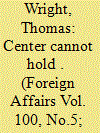

|
|
|
|
|
| Summary/Abstract |
Before the COVID-19 pandemic began, Washington was coalescing
around a new bipartisan consensus: great-power competition,
especially with China, ought to be the main organizing principle
of U.S. foreign policy. For some, the pandemic called that notion into
question by suggesting that transnational threats pose an even greater
danger to the American public than ascendant rival powers. Skeptics of
great-power competition, such as Senator Bernie Sanders, an independent from Vermont, argued that the United States should seek to deescalate tensions with China so that the two countries can work together
to manage borderless risks such as pandemics and climate change.
|
|
|
|
|
|
|
|
|
|
|
|
|
|
|
|
| 4 |
ID:
182251


|
|
|
|
|
| Summary/Abstract |
In August 1941, U.S. President Franklin Roosevelt and British
Prime Minister Winston Churchill met aboard the USSAugusta
in the waters o Newfoundland to discuss the war then raging in
Europe and Asia. As they considered the future, the two leaders remembered the past. The deprivations and divisions fueled by World
War I and the Great Depression, they knew, had eventually led to
the devastation of World War II.
|
|
|
|
|
|
|
|
|
|
|
|
|
|
|
|
| 5 |
ID:
182244
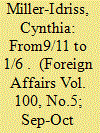

|
|
|
|
|
| Summary/Abstract |
Radical ideas that are today considered right-wing—white supremacism, violent antigovernment
libertarianism, Christian extremism—
haveplayed starring roles in the American story since theverybeginning. For
most of the postwar era, however, the far
right has mostly stayed underground,
relegated to the fringes of American
society.
|
|
|
|
|
|
|
|
|
|
|
|
|
|
|
|
| 6 |
ID:
182242
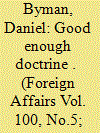

|
|
|
|
|
| Summary/Abstract |
In the20yearssince the 9/11 attack,
U.S. counterterrorism policy has
achieved some striking successes
and suered some horri¼c failures.On
the positive side, jihadi organizations
such as al Qaeda and the Islamic State
(also known as ISIS) are now shadows of
their former selves, and the United
States has avoided another catastrophic,
9/11-scale attack.Theworst fears, or
eventhe more modest ones, of U.S.
counterterrorism ocials have not been
realized. With terrorism less of an
immediate concern, U.S. President Joe
Biden has turned Washington’s focus
toward China, climate change, and
other issues—even withdrawing U.S.
troops from Afghanistan as part of an
eort to end the so-called forever wars.
|
|
|
|
|
|
|
|
|
|
|
|
|
|
|
|
| 7 |
ID:
182250


|
|
|
|
|
| Summary/Abstract |
The Islamic Republic of Iran is a state divided against itself. Since
its inception in 1979, it has been de¼ned by tension between the
president, who heads its elected government, and the supreme
leader, who leads the parallel state institutions that embody modern
Iran’s revolutionary Islamist ideals. The current supreme leader, Ali
Khamenei, served as president from 1981 to 1989. During his tenure as
president, he clashed over matters of policy, personnel, and ideology
with the supreme leader at the time, Ruhollah Khomeini, the charismatic
cleric who had spearheaded the Iranian Revolution. After Khomeini
died, in 1989, Khamenei was appointed supreme leader and went on to
do battle with a long line of presidents more moderate than himself.
|
|
|
|
|
|
|
|
|
|
|
|
|
|
|
|
| 8 |
ID:
182247


|
|
|
|
|
| Summary/Abstract |
When the Biden administration, following a months-long
review, announced its North Korea policy this past April—
“diplomacy, as well as stern deterrence”—the news barely
registered. The question of how to deal with the nuclear-armed pariah
state, a matter never resolved but never fully escalating into an existential threat, has dogged a long succession of U.S. administrations.
The prevailing sense today, amid a pandemic and heightened greatpower tension, seems to be that Washington has bigger ¼sh to fry and
more urgent crises to focus on.
|
|
|
|
|
|
|
|
|
|
|
|
|
|
|
|
| 9 |
ID:
182243


|
|
|
|
|
| Summary/Abstract |
What,” I sometimes ask students in a class I teach on
the history of terrorism,
“was the name of the Islamic State’s
branch in Europe?”Itis a trick question: the Islamic State (also known as
ISIS) never set up a full-Èedged European branch.Thegroup’s self-proclaimed
caliph, Abu Bakr al-Baghdadi, knew
better than to try.By2014,when ISIS
formalized its split from al Qaeda and
established itself as the dominant
player in the global Sala¼-jihadi movement, Western security services had
¼gured out how to make it eectively
impossible for the group to establish a
base of operations in Europe or North
America. Like al Qaeda before it, ISIS
was only ever present in theWe s tin the
form of disparate cells and sympathizers.
|
|
|
|
|
|
|
|
|
|
|
|
|
|
|
|
| 10 |
ID:
182248


|
|
|
|
|
| Summary/Abstract |
For nearly three decades after the end of the Cold War, U.S.
foreign policy was characterized by a bipartisan consensus:
that as the world’s “indispensable nation” and with no competitor, the United States had little choice but to pursue a transformational agenda on the world stage. Over the last few years, however,
that consensus has collapsed. A growing chorus of voices are advocating a strategy of restraint—a less activist approach that focuses on
diplomatic and economic engagement over military intervention.
And they have found a receptive audience.
|
|
|
|
|
|
|
|
|
|
|
|
|
|
|
|
| 11 |
ID:
182241


|
|
|
|
|
| Summary/Abstract |
Notwenty-¼rst-century event
has shaped the United States
and its role in the world as
much as 9/11.Theattacks pierced the
complacency of the post–ColdWar
decade and shattered the illusion that
history was ending with the triumph of
American-led globalization.Thescale of
the U.S. response remade American
government, foreign policy, politics, and
society inwaysthat continue to generate aftershocks. Onlybyinterrogating
the excesses of that response can Americans understand what their country has
become and where it needs togo.
|
|
|
|
|
|
|
|
|
|
|
|
|
|
|
|
| 12 |
ID:
182249


|
|
|
|
|
| Summary/Abstract |
In theory, superpowers should possess a range of foreign policy
tools: military might, cultural cachet, diplomatic persuasion,
technological prowess, economic aid, and so on. But to anyone
paying attention to U.S. foreign policy for the past decade, it has
become obvious that the United States relies on one tool above all:
economic sanctions.
|
|
|
|
|
|
|
|
|
|
|
|
|
|
|
|
| 13 |
ID:
182245


|
|
|
|
|
| Summary/Abstract |
My¼rst mission as a paramilitary ocer with the CIA was
against a top-ten al Qaeda
target.Itwas the autumn of2009,and I
had been deployed inmynew job for a
total of two days. But I was no stranger
to Afghanistan, having already fought
there (aswellas in Iraq) as a Marine
Corps ocer over the previous sixyears.
Onthis mission, I was joinedbythe
Afghan counterterrorism unit I advised
and a handful of members from SEAL
TeamSix. Our plan was to conduct a
raid to capture or kill our target, who was
coming across the border from Pakistan
for a meeting in the Korengal Valley.
|
|
|
|
|
|
|
|
|
|
|
|
|
|
|
|
|
|
|
|
|